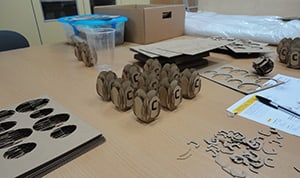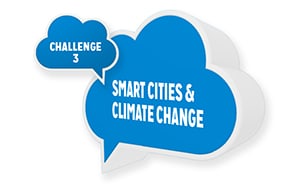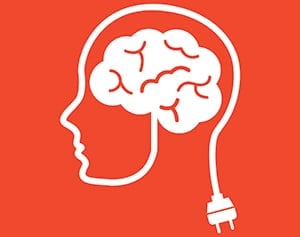
The world has changed, and so should our business theories, strategies and underlying assumptions. Easy to say, perhaps, not so easy to execute. But the basic premise, that stability is the norm and upheaval intense but brief and infrequent, no longer holds true. The periods of stability between punctuations have become dramatically shorter as technology develops, and we’re experiencing a permanent flux of change that calls for adaptability, flexibility, swift and agile responses.
Major geopolitical shifts opening up new markets and breaking North America’s hegemony in many industries, the rise of globalization enabling competition from pretty much anywhere, anytime, the freedom and flexibility of digitization: these are all factors behind the end of sustainable competitive advantage. Meaning it’s not enough anymore to be the best in your field and hold onto your market share. In the ICT sector, in particular, digitization and globalization mean not having to own your capex-heavy assets as a prerequisite to entering the market. Programmers can be based anywhere in the world, web capacity can be bought made-to-measure, servers leased as necessary.
Competition is opened up, no longer delineated by a single industry, but encompassing entire arenas of activity, breaking down traditional boundaries between sectors and blowing up silo walls.
Robert Goizueta of Coca Cola famously exemplified arena thinking with his aim for his particular brand of soft drink to increase its percentage of the average daily human intake of 64 fluid ounces. He was openly pitting his company’s soda against not just other soft drinks, but tea, coffee, juice, even water – the whole beverage arena, much more than one industry.
This blurring of boundaries has always been apparent in the ICT sector – its very name combines both information and communication technologies – but is increasing on a massive scale as technology advances and long-standing business models are threatened. Witness the rise of OTTs as ferocious competitors from the internet world; the convergence of broadcasting and broadband; how cars are becoming mere nodes on an information system; or how big data analytics are growing so effective that human insurance underwriters may soon be out of work in many instances.
And the advent of the Internet of Things is speeding up the process still further. Are washing machines technically-enhanced machines to wash clothes or complex computers with a clothes-washing function? Are smart grids the domain of ICTs, energy companies, consultants or systems integrators? Add in robotics and the merging of the digital and physical worlds, and we are truly in a new competitive era dominated by uncertainty.
Preparing for this uncertain future means moving away from older models, creating resilience to change and openness to new information. Mixing up the structure of a business may mean adopting a portfolio approach based on differing degrees of uncertainty in markets and technologies. Lower risk core business should be supplemented with fairly sure candidates for next generation core products and services. Investing wisely in higher-risk innovation for longer-term growth means getting smart at managing options, being willing to fail where necessary and kill a project, taking it as an experiment from which to learn, not an admission of defeat. Getting in early may mean investing in several competing new technologies before a clear winner is declared, automatically condemning several other options in order to reap the sizeable benefits of not waiting for the proven – therefore expensive – success of one.
This kind of agility and ability to reconfigure quickly is at the heart of the virtualization of network components and software defined networks that are beginning to radically alter the shape of the ICT industry. It calls for maximum flexibility and responsiveness across the whole system, at the expense of optimization of one task or element within that system.
It’s also a business mindset that government and industry leaders alike need to take on board to face the new fluid realities of change as the new norm – and it’s the basis of the new playbook for strategy I’ll be proposing at the Leadership Summit on The Future at ITU Telecom World 2014 in Doha this December.




 The challenges of embracing the digital era are bringing us into a perfect storm of change. Old systems designed for a pre-Internet world are reaching their limit, overwhelmed by massive economic, financial and political uncertainty, increasing complexity, major environmental pressures, and dramatic, disruptive developments across multiple fields of science and technology. As a result, business cycles are accelerating and shortening, governments are under growing pressure to respond and adapt, and individuals are facing disruption in every aspect of their lives, from job security and financial uncertainty to the reshaping of education and healthcare.
The challenges of embracing the digital era are bringing us into a perfect storm of change. Old systems designed for a pre-Internet world are reaching their limit, overwhelmed by massive economic, financial and political uncertainty, increasing complexity, major environmental pressures, and dramatic, disruptive developments across multiple fields of science and technology. As a result, business cycles are accelerating and shortening, governments are under growing pressure to respond and adapt, and individuals are facing disruption in every aspect of their lives, from job security and financial uncertainty to the reshaping of education and healthcare.
 24 innovative minds are headed to Linz, Austria for the
24 innovative minds are headed to Linz, Austria for the 
 Whether you live to work or work to live, for the vast majority of people throughout the world having a job of some sort is central to the way our lives are structured. So what happens when the drones and the robots take over?
Whether you live to work or work to live, for the vast majority of people throughout the world having a job of some sort is central to the way our lives are structured. So what happens when the drones and the robots take over?
 The ITU Telecom World Young Innovators Competition in partnership with the World Health Organization (WHO) is looking for innovative ideas on how information and communication technologies (ICTs) can help smart cities to slow down or mitigate the effects of climate change for the benefit of global health.
The ITU Telecom World Young Innovators Competition in partnership with the World Health Organization (WHO) is looking for innovative ideas on how information and communication technologies (ICTs) can help smart cities to slow down or mitigate the effects of climate change for the benefit of global health.
 Affordable prosthetic limbs for Sudanese soldiers manufactured on 3D printers, grandmothers bringing the know-how on running solar electricity generators back to their remote villages, electric light powered by a bag of earth and gravity alone, powerful yet cheap batteries to power drones used in disaster management. Projects such as these may not be the most visible face of the dramatic growth of new technologies – but their impact on local communities across the developing world is nothing short of revolutionary.
Affordable prosthetic limbs for Sudanese soldiers manufactured on 3D printers, grandmothers bringing the know-how on running solar electricity generators back to their remote villages, electric light powered by a bag of earth and gravity alone, powerful yet cheap batteries to power drones used in disaster management. Projects such as these may not be the most visible face of the dramatic growth of new technologies – but their impact on local communities across the developing world is nothing short of revolutionary.
 We live in exciting times. Times full of the promise of progress, where the exponential pace of technological development is both visible and beneficial to ever more of the world’s population. From e-medicine to digital education, next-generation transport systems to smart grid solutions, the near future looks to be healthier, smarter, greener, less wasteful of natural and financial resources.
We live in exciting times. Times full of the promise of progress, where the exponential pace of technological development is both visible and beneficial to ever more of the world’s population. From e-medicine to digital education, next-generation transport systems to smart grid solutions, the near future looks to be healthier, smarter, greener, less wasteful of natural and financial resources.
 More than 200 entries from 48 countries worldwide, hundreds of ideas, comments and unique perspectives on the creation of local digital content, many hours of serious consideration by our panel of judges – and the winners of the
More than 200 entries from 48 countries worldwide, hundreds of ideas, comments and unique perspectives on the creation of local digital content, many hours of serious consideration by our panel of judges – and the winners of the 


 The current telco crunch is not new. Voice revenues have collapsed in developed and emerging markets alike, whilst data traffic from OTT players continues to increase exponentially. So costs are going through the roof just as revenues are vanishing. Life as telcos have known it is unsustainable – and change is inevitable.
The current telco crunch is not new. Voice revenues have collapsed in developed and emerging markets alike, whilst data traffic from OTT players continues to increase exponentially. So costs are going through the roof just as revenues are vanishing. Life as telcos have known it is unsustainable – and change is inevitable.